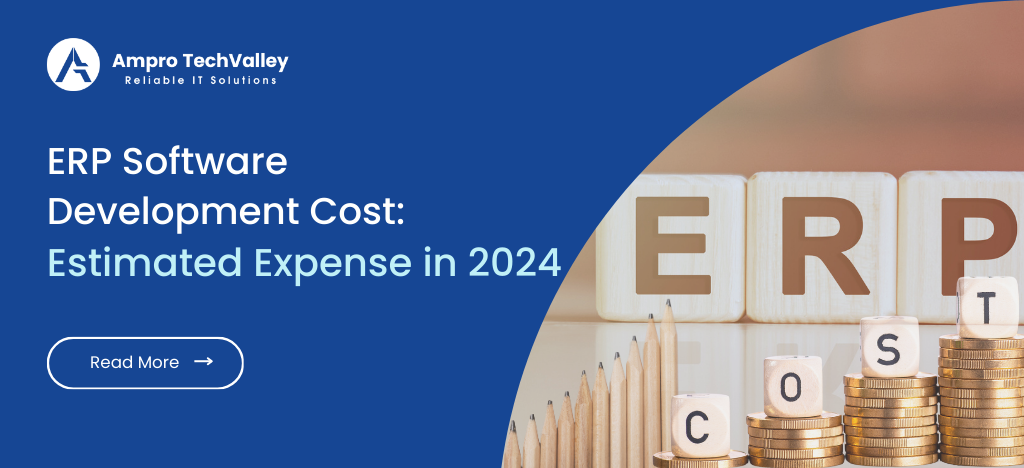ERP software development cost has come out as a source of competitive edge. However, the first step to a successful implementation is recognizing its importance. We will examine the key components of ERP software development in this article. Learn how ERP can improve profits, improve data accuracy, and give you an advantage over others. We’ll examine the elements that will affect prices in 2024 to help you prepare your budget. Examine the planned cost ranges and time investment to gain important knowledge for an ERP deployment that works. Watch this space for helpful knowledge that can change the way your company operates.
Why is ERP Software Development Vital for Your Business?
Let’s examine why your company need an ERP system in more detail before getting into the specifics of ERP software development cost. ERP software serves as a single hub that integrates different business activities and operations, which is why it’s so important.
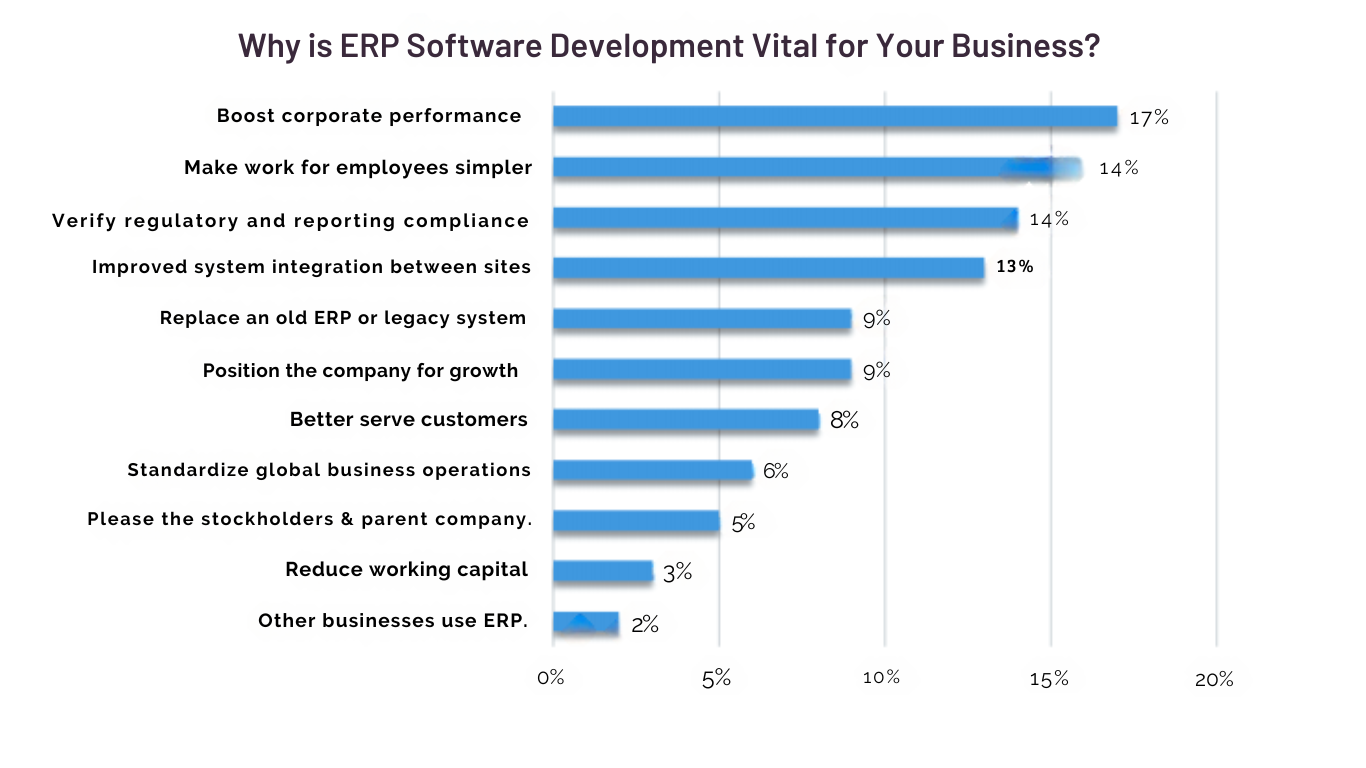
- Improved Productivity: By implementing automation, ERP systems improve output by reducing the amount of human effort and increasing profitability.
- Precise Data: Data centralization contributes to trustworthy data preservation, error reduction, and optimal information maintenance.
- Improved Decision-Making: You can make more informed choices based on current, trustworthy information when you have real-time access to data.
- Scalability: ERP systems are scalable, meaning they can adjust to meet your changing demands as the company does.
- Competitive Advantage: ERP software can offer you an advantage over competitors by streamlining company operations and enhancing customer support.
ERP software development cost is essentially a calculated investment that may greatly improve the efficiency of your company.
Factors Affecting the ERP Development Cost in 2024
To effectively estimate the expenditures, it is crucial to consider all relevant elements as the cost of developing ERP software development cost might vary significantly depending on the number of them. The following are the main variables that may affect ERP software development costs in 2024:
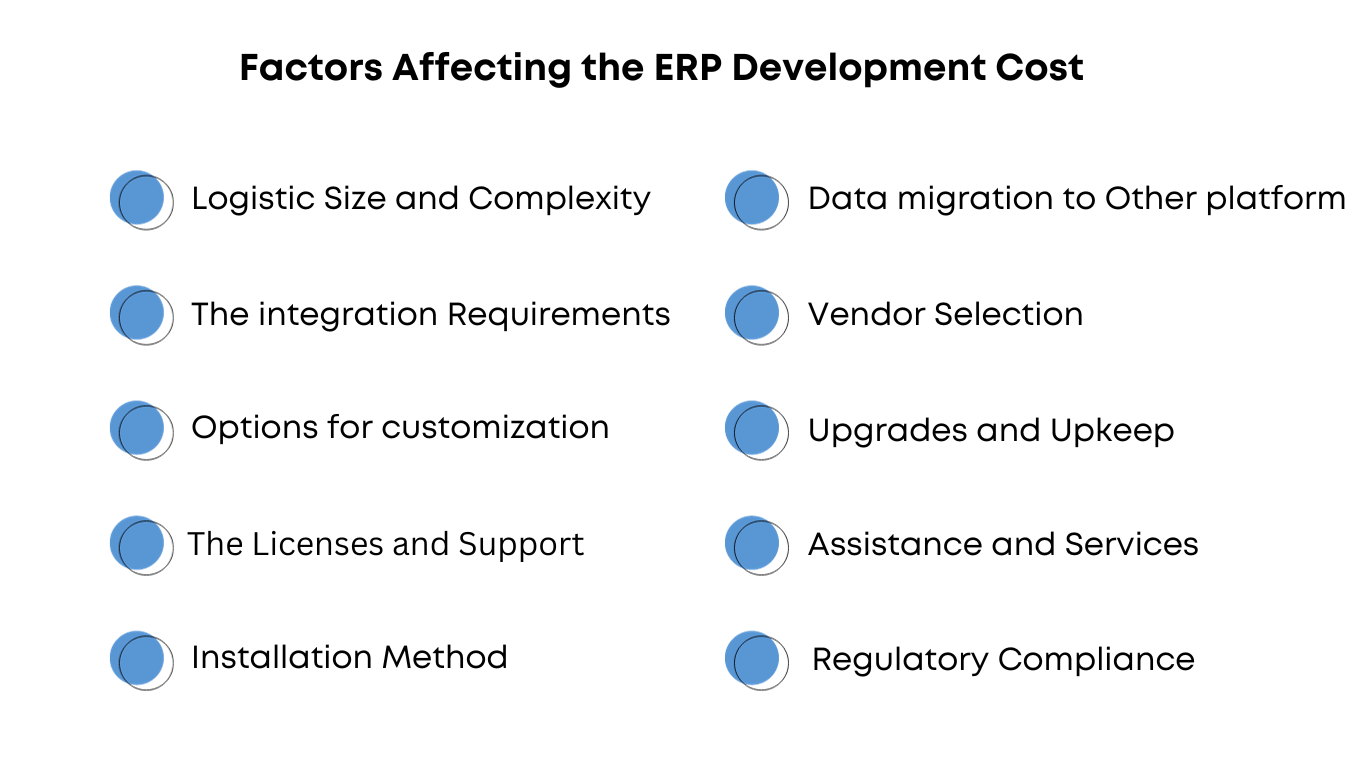
- Logistic Size and Complexity: The larger and more intricate your ERP Software development cost is, the more expensive it will be. Pre-made solutions are less expensive than customized ones with additional functionality.
- The integration Requirements: ERP software development cost may become more expensive and complex if it must interface with other systems.
- Options for customization: Because more development effort is required, modifying the ERP system to meet your unique business needs may result in increased ERP Software Development costs.
- The Licenses and Support: Take into account the costs associated with both the ERP software license and continuous support. Costs may differ according to the software selection.
- Installation Method: Costs vary depending on whether ERP solutions are installed on-premises (an upfront expenditure) or in the cloud (a subscription-based model).
- Data migration to another platform: It can be expensive to move current data to the new ERP system, particularly if there is a lot of information or if significant cleansing and organization are required.
- Partner Selection: The prices and services offered by various ERP providers differ, which affects the project’s total cost.
- Upgrades and Upkeep: It’s critical to carry out routine maintenance and updates. You can ensure that your ERP system is updated and functional by considering these.
- Assistance and Services: Two of the most crucial costs for the success of an ERP system are onboarding new employees and providing ongoing assistance following installation.
- Regulatory Compliance: It may be necessary to include features to ensure that the ERP system complies with industry rules and compliance requirements, which might raise the cost of development.
Businesses may successfully plan their ERP projects by taking into account their needs and budget limits by having a thorough understanding of these factors.
Understanding ERP Software Development Cost: A Detailed Overview
Determining the precise cost of creating an Enterprise Resource Planning (ERP) system in 2024 might be a challenging task. Taking into consideration different business demands and sizes, let’s dissect the factors impacting these prices and investigate the overall price range.
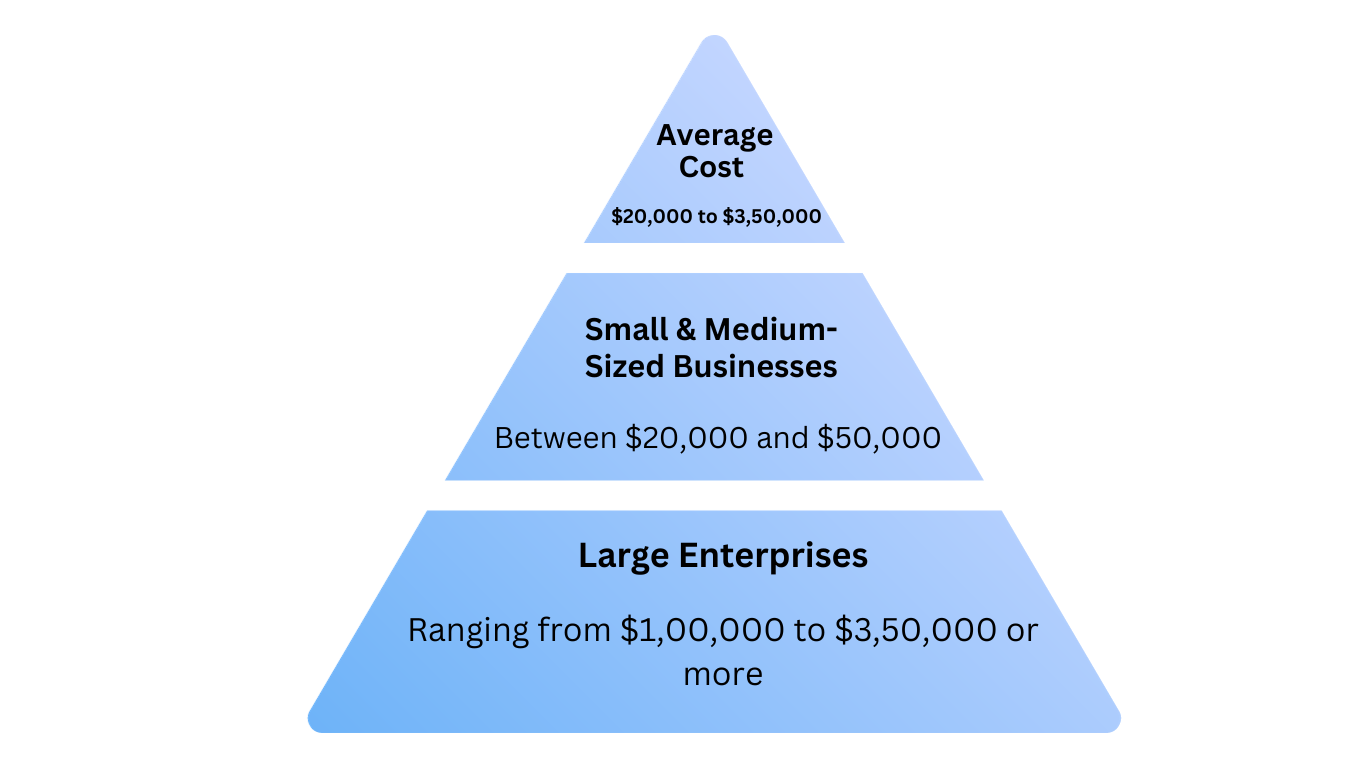
- Projecting the Cost Range: From $20,000 to $3,50,000, the average cost of building ERP software is projected to vary significantly by 2024. This range meets the demands and sizes of enterprises of all kinds:
- Small and Medium-Sized Businesses: Businesses with entry-level ERP requirements should budget between $20,000 and $50,000, as these solutions may meet basic needs without requiring significant adjustments.
- Large Enterprises: Companies with complex needs, such as extensive customizations, multiple system integrations, or advanced features, may face costs ranging from $1,00,000 to $3,50,000 or more.
Importance of Accurate Project Evaluation:
Businesses should collaborate with ERP software manufacturers or development firms because of the wide range of ERP system expenses. Businesses may efficiently manage their budget and match their ERP system to their specific requirements by getting accurate prices and getting an in-depth project review.
In 2024, making wise judgements will depend on your ability to understand the variables influencing ERP system costs. Through an in-depth review of these factors and specific estimates from experts, companies may set out on their ERP development path with sufficient knowledge and financial clarity.
What length of time Does ERP Software Development Take?
ERP software development is a time-consuming process. The timeframe for ERP development can vary significantly based on project complexity and customization needs. Generally, the development process can be divided into the following stages:
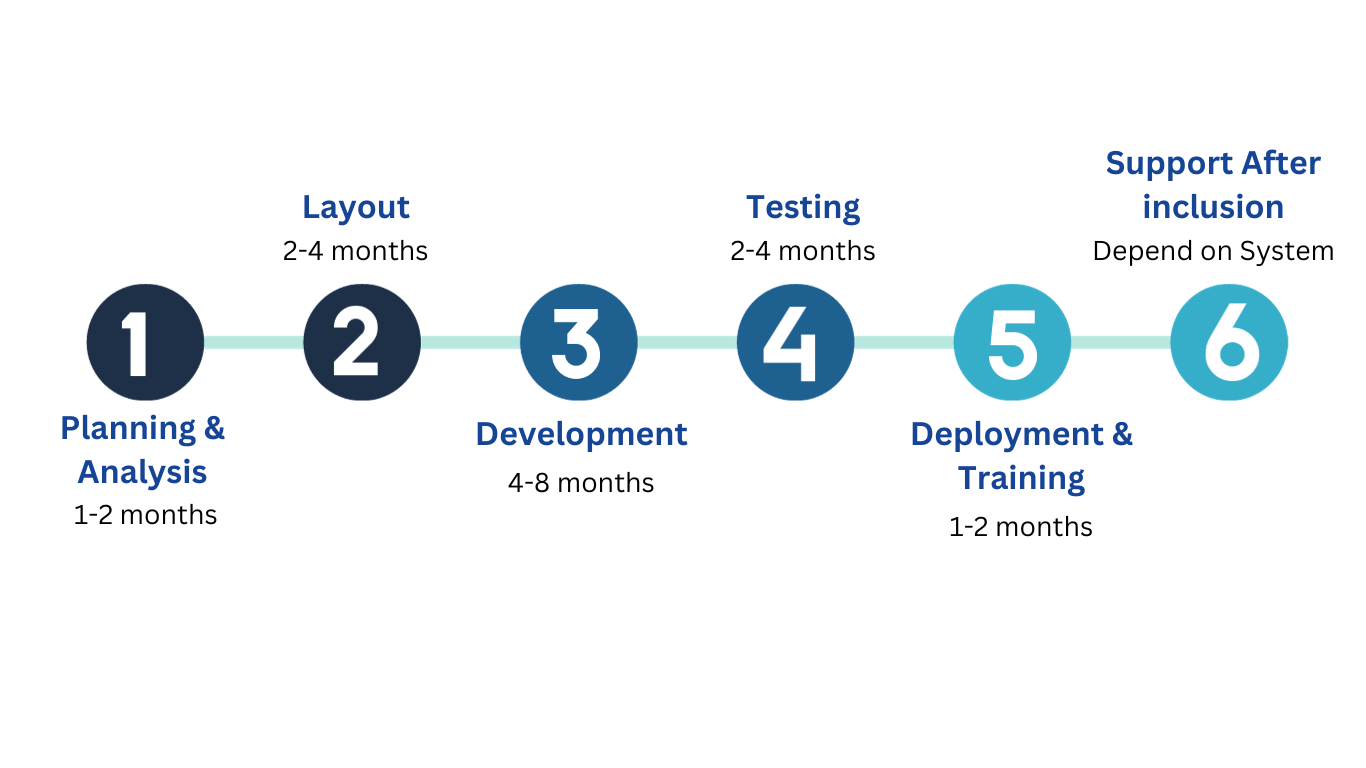
- Planning and Analysis: This initial phase involves defining project requirements, goals, and scope. Time Overall will depend on the size and Difficulty of the project but according to the research, it would take 1-2 months.
- Layout: The framework, storage design, and front end of the system are designed at this stage. The design phase can take 2-4 months, again depending on project complexity.
- Development: Actual coding and development occur in this phase, taking around 4-8 months. Complex customizations or integrations may extend this period.
- Testing: Rigorous testing is crucial and typically takes 2-4 months. User acceptance testing is a vital component of this stage.
- Deployment and Training: Once testing is complete, the system is deployed, and training is provided to users. This stage can take 1-2 months.
- Post-Implementation Support: Ongoing support and maintenance are essential and can extend indefinitely, depending on the chosen ERP system and the organization’s needs.
The whole process of development may need as long as two years or longer. It’s necessary to be ready for the amount of time required to ensure an ERP deployment that is successful.
In what ways does Ampro TechValley ensure a balance between cost-effectiveness and ERP system scalability?
Ampro TechValley achieves a perfect balance between cost-effectiveness and scalability in its ERP software development solutions. They customize the system precisely to the client’s requirements, ensuring they pay for what they need without unnecessary expenses. Simultaneously, the solutions are designed to expand smoothly as the business grows, maintaining efficiency and affordability. This approach guarantees a professional, tailored solution that evolves with the client’s needs, providing excellent value for their investment.
- Tailored Expertise: Benefit from expert consultation and tailored solutions, ensuring your ERP system meets your industry-specific needs.
- Cutting-Edge Technology: Harness innovative technology for robust, future-ready ERP systems, giving your business a competitive advantage.
- User-Centric Design: Experience seamless navigation with intuitive interfaces, enhancing user productivity and overall system efficiency.
- Security Assurance: Safeguard your critical business data with advanced encryption protocols and stringent security measures, ensuring data integrity and confidentiality.
- Proactive Support: Receive prompt and reliable support services, addressing any issues swiftly to maintain uninterrupted operations and optimize your ERP investment.

Conclusion
In 2024, ERP software development remains a strategic investment for businesses seeking to improve efficiency, data accuracy, and overall competitiveness. Understanding the factors influencing ERP development costs, along with the time commitment involved, is crucial for accurate budgeting and project planning. While the cost of ERP development can vary significantly, the benefits of an efficiently implemented ERP system can far outweigh the initial expenses. To get a precise estimate for your business’s ERP software development cost, it is advisable to consult with experienced ERP vendors or development firms.

